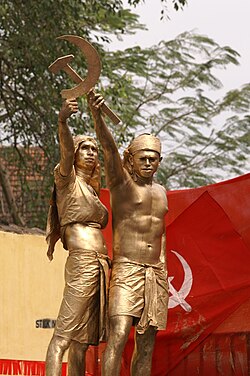IntroductionCommunism (from Latin communis, 'common, universal') is a left-wing to far-left sociopolitical, philosophical, and economic ideology within the socialist movement, whose goal is the creation of a communist society, a socioeconomic order centered around common ownership of the means of production, distribution, and exchange that allocates products to everyone in the society based on need. A communist society would entail the absence of private property and social classes, and ultimately money and the state (or nation state). Communists often seek a voluntary state of self-governance but disagree on the means to this end. This reflects a distinction between a more libertarian socialist approach of communization, revolutionary spontaneity, and workers' self-management, and a more authoritarian vanguardist or communist party-driven approach through the development of a socialist state, followed by the withering away of the state. As one of the main ideologies on the political spectrum, communism is placed on the left-wing alongside socialism, and communist parties and movements have been described as radical left or far-left. Variants of communism have been developed throughout history, including anarchist communism, Marxist schools of thought, and religious communism, among others. Communism encompasses a variety of schools of thought, which broadly include Marxism, Leninism, and libertarian communism, as well as the political ideologies grouped around those. All of these different ideologies generally share the analysis that the current order of society stems from capitalism, its economic system, and mode of production, that in this system there are two major social classes, that the relationship between these two classes is exploitative, and that this situation can only ultimately be resolved through a social revolution. The two classes are the proletariat, who make up the majority of the population within society and must sell their labor power to survive, and the bourgeoisie, a small minority that derives profit from employing the working class through private ownership of the means of production. According to this analysis, a communist revolution would put the working class in power, and in turn establish common ownership of property, the primary element in the transformation of society towards a communist mode of production. Communism in its modern form grew out of the socialist movement in 19th-century Europe that argued capitalism caused the misery of urban factory workers. In the 20th century, several ostensibly Communist governments espousing Marxism–Leninism and its variants came into power, first in the Soviet Union with the Russian Revolution of 1917, and then in portions of Eastern Europe, Asia, and a few other regions after World War II. As one of the many types of socialism, communism became the dominant political tendency, along with social democracy, within the international socialist movement by the early 1920s. ( Full article...) Selected article
The Communist Party of Indonesia (
Indonesian: Partai Komunis Indonesia, PKI) was a
political party in
Indonesia. With growing popular support and a membership of about 3 million by 1965, the PKI was the strongest communist party outside the
Soviet Union and
China. The party had a firm base in various mass organizations, estimates claim that the total membership of the party and its frontal organizations might have at its peak organized a fifth of the Indonesian population. In March 1962 PKI joined the government. PKI leaders Aidit and Njoto were named advisory ministers.
Following the military coup in 1965, between 300,000 and one million Indonesians were killed in the mass killings that followed as the new regime cracked down on PKI. A CIA study of the events in Indonesia assessed that "In terms of the numbers killed the anti-PKI massacres in Indonesia rank as one of the worst mass murders of the 20th century...". Selected biography
Knud Jespersen (12 April 1926,
Sulsted – 1 December 1977) was a
Danish politician. Jespersen served as chairman of the
Communist Party of Denmark between 1958 and 1977 and was a member of parliament between 1973 and 1977.
During his teenage years Jespersen joined the resistance movement against the German occupation of Denmark. Both his mother and stepfather were members of the Communist Party. Following the 'police action' against the Communist Party on 22 June 1941, the entire household joined the underground resistance. In 1942, Jespersen himself became a member of the Communist Party. Both Jespersen and his stepfather were arrested and held in concentration camps. His stepfather, Christian Andersen, was arrested by the Gestapo in a raid on the family residence in December 1943. He died in the Neuengamme concentration camp a year later. Jespersen arrested on 27 March 1945 and was detained at the Frøslev Prison Camp. Jespersen was scheduled to be transferred to Germany, but was released after the Liberation on 5 May 1945. After the war Jespersen became a trade union activist. Following his release he began to work as a casual labourer. He was elected local union chairman of warehouse workers in Aalborg in 1953. During the strike movements of the spring of 1956, he became known as an agitator. Did you know...
Selected image Photo credit: David Wilmot [1]
Related portalsRelated WikiprojectsRelated featured content Participate!Everyone is welcome to participate in WikiProject Socialism, where editors collaborate to improve all aspects related to socialism on Wikipedia. Selected quote
SubcategoriesWant to find an article related to communism? Try browsing through any of the main
categories below:
Select [►] to view subcategories
GeneralVariations of CommunismOrganizations and ruling parties, past and present
Personalities
Present and former Socialist states (under the direction of Communist parties)
Ideology and tactics
StructureMarxian economics topicsHistorical events
Military topics
Artists and writers
Influential works
Anti-communism
Things you can do
Communism in non-English WikipediasArticles:
Associated WikimediaThe following Wikimedia Foundation sister projects provide more on this subject:
Discover Wikipedia using
portals |
























